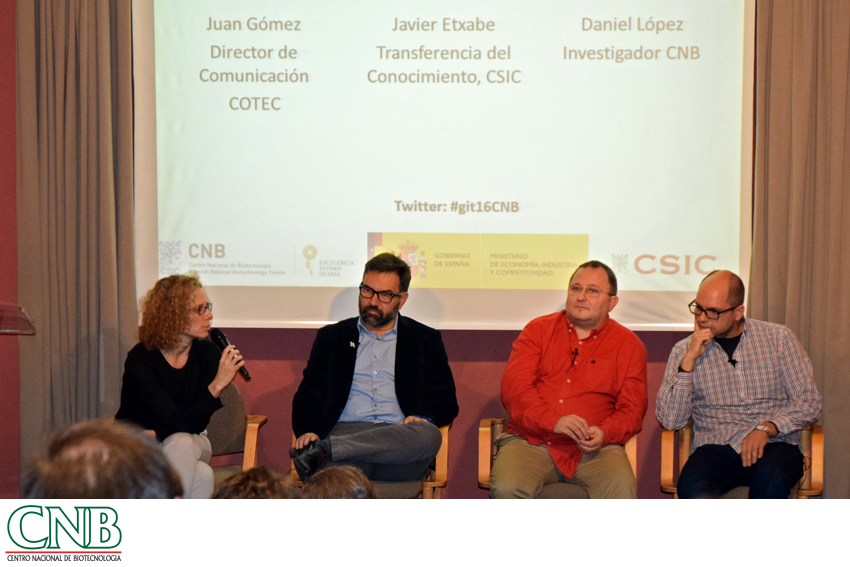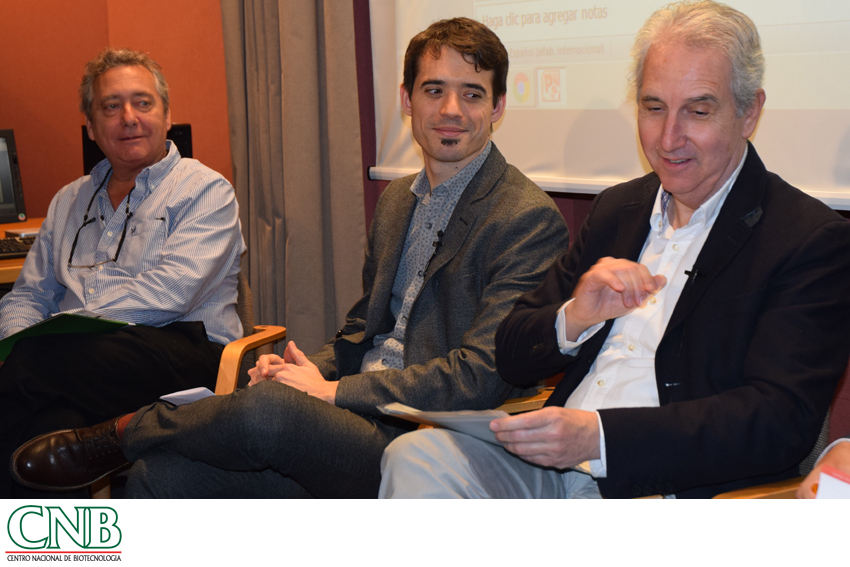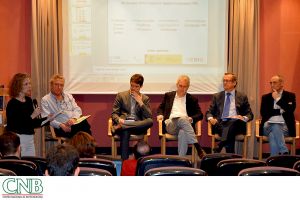Spain needs to modernize to bring it onto the path of innovation. These words of journalist Iñaki Gabilondo summarize the Global ImasT 2016, a day on which education, talent, entrepreneurship, investment and, above all, technology transfer were discussed.
The Centro Nacional de Biotecnología (CNB-CSIC) participated on 23 November, along with 11 other Spanish institutions, in the national event organized by eGauss Business Holding. During the meeting, organized by Ana Sanz, Head of Technology Transfer at the CNB-CSIC, general round tables transmitted by video conference alternated with others specialized in innovation biotechnology that took place physically at the CNB-CSIC.
Iñaki Gabilondo opened the day with a surprising and provocative talk. He spoke of the need to change our attitude toward the future, the importance of education and the need for political commitment that is maintained independently of changes in government. According to Gabilondo, "what Spain needs is to catch the train of modernity. It’s moving at full speed and we’re letting it go." We must aim for change or we will miss our opportunity. In the words of the journalist, "to undertake, to act and to do is imperative. We must stand on tiptoe and look at the horizon. We must learn to dream."
New models, new ways of collaborating
A concern repeated throughout the day was the need to optimize relationships among the different players in the Spanish innovative ecosystem. In the first session, Marta Villanueva (AEC), Josep Piqué (IASP) and Javier García (NANOMOL, Univ. Alicante) mentioned collaborative formulas such as new models, the need for talent as raw material in the theory of knowledge, and education as the basis for a modern, innovative society. Immediately afterwards, the CNB-CSIC round table confirmed similar needs in the field of biotechnology.
Daniel López (CNB-CSIC) pointed out the difficulties in a scientist’s normal routine, juggling quality scientific research and the dissemination of its results with the requirements to patent and promote business projects. He discussed the desirability of seeking new formulas that allow evaluation of innovation in public institutions and among the researchers themselves.
Javier Etxabe (CSIC VATC) stated that progress has been made in this area in recent years and that, although improvements are needed, researchers and research centers are increasingly evaluated based on patents obtained and brought to market.
For his part, Juan Gómez (COTEC Foundation) emphasized the need to collaborate with companies from the outset, to understand the needs of society.
Market and investment
In the second part of the meeting, discussion focussed on innovation funding models. Emma Fernández (KleinRock Advisors), Senén Barro (Red Emprendia) and Rodrigo Recondo (INCARI) conveyed the message that, although the development in Spain is positive, it is still difficult to find investment capital for advanced projects as well as early stages.
Concluding the day was a local round table on the role of financing, the market and knowledge in entrepreneurship and transfer in biotechnology. Participants were Ion Arocena (ASEBIO), Enrique Castellón (CRB Inverbio), Jaime del Barrio (Ernst & Young), Antonio Bernad (CNB-CSIC) and Antonio Leyva (CNB-CSIC). They highlighted the delay with which venture capital began to enter Spain, a delay that, according to Castellón, continues to be an influence. It was also stressed that many projects are unsuccessful not because capital is lacking, but because the team is not convincing, the project is poorly explained, or is presented to the wrong investors.
They also emphasized the bureaucratic obstacles that frustrate companies that hope to innovate in Spain, and the need for the public sector to take risks as well. For a project to work, a good invention is not sufficient; it requires good management and a suitable partner to bring it to market. In the words of Jaime del Barrio, "in Spain there is money, but we need to improve education and bureaucracy."
The meeting ended with the feeling that the messages of the day must be materialized into realistic, effective actions. In the words of Gabilondo, "Acting and doing are essential".


Global I+T
Global I+T is an event organized and promoted by the company eGauss Holding to establish contacts among the various stakeholders in the biotechnology sector, including scientists, companies, investors and public administrations, using a round table format to share opinions as to how to advance these goals in Spain. Since 2013, more than 150 projects have been presented to investors in the Global I+T framework; more than 200 speakers have taken part and more than 3,000 people have participated in these sessions, in person or virtually.
eGauss Business Holding IT, organizer
EGauss Business Holding, founded in 2013 to support the development of technology companies, is the organizer of Global ImasT. EGauss focusses on the connection between research centres, companies and the market. Its strategy is to activate innovation ecosystems to maximize return.
eGauss facilitates the nexus and the solutions needed for the university to turn research into high-growth innovation, and thus to have an an impact on society. eGauss likewise helps companies to address business and innovation challenges to boost growth and return on investment.






